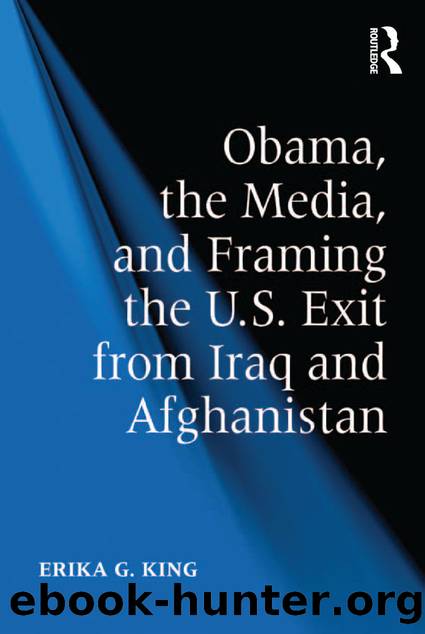Obama, the Media, and Framing the U.S. Exit From Iraq and Afghanistan by Erika G King Professor

Author:Erika G King Professor [Professor, Erika G King]
Language: eng
Format: epub
Tags: Political Process, Leadership, Political Science, Essays
ISBN: 9781317086444
Google: 6Bc3DAAAQBAJ
Goodreads: 30376876
Publisher: Routledge
Published: 2016-05-23T00:00:00+00:00
Chapter 4
Turning the Page on Operation Iraqi Freedom
In a July 2008 New York Times op-ed piece titled âMy Plan for Iraq,â presumptive Democratic presidential nominee Barack Obama recapitulated almost six years of withering criticism of the Iraq War. Declaring that âIraq is not the central front in the war on terrorism, and it never has been,â he characterized the conflict as a âgrave mistakeâ and âthe greatest strategic blunder in the recent history of American foreign policy.â He thus pledged that on his first day in office he would âgive the military a new mission: ending this warâ and initiate a phased redeployment of U.S. combat troops. Obama emphasized that the drawdown would be undertaken thoughtfully and deliberately; as he memorably phrased it, âWe must be as careful getting out of Iraq as we were careless getting inâ (Obama 2008b).
Opposition to Iraq had been a constant rallying cry for Obama since the fall of 2002, when as a little-known Illinois state senator he had first characterized the proposed incursion against Saddam Hussein as âa dumb war ⦠a rash war,â based ânot on reason but on passion, not on principle but on politicsâ (Obama 2002). Upon assuming his U.S. Senate seat in 2005, Obama continued to condemn the war, but while his words remained highly critical his attention quickly turned to a more pragmatic issue: how best to overcome the harsh realities the U.S. now faced in the conflict. In every public statement on Iraq, the senator would roundly castigate the Bush administration for a litany of failures from the faulty intelligence used to make the case for war to the extraordinary mismanagement of the war itself. But his primary concern was focusing the national debate on the best outcome for a war in which there unfortunately were âno magic bulletsâ (Obama 2005).
âWar is a serious business,â Obama flatly declared in a speech to the Chicago Council on Foreign Relations in November 2005; America therefore needed to cease the Washington âpolitical warâ of âtalking points and Sunday news shows and spinâ and develop âa pragmatic solution to the real war weâre facing in Iraq.â Rather than retreating to the divisive and politically expedient âcut and run or stay the courseâ rhetoric, those responsible for U.S. national security had to get down to the critical task of devising a strategic approach that would allow the nation to âexit in a responsible wayâwith the hope of leaving a stable foundation for the future, but at the very least taking care not to plunge the country into an even deeper and, perhaps, irreparable crisisâ (Obama 2005).
Download
This site does not store any files on its server. We only index and link to content provided by other sites. Please contact the content providers to delete copyright contents if any and email us, we'll remove relevant links or contents immediately.
What's Done in Darkness by Kayla Perrin(25500)
Shot Through the Heart: DI Grace Fisher 2 by Isabelle Grey(18219)
Shot Through the Heart by Mercy Celeste(18160)
The Fifty Shades Trilogy & Grey by E L James(17774)
The 3rd Cycle of the Betrayed Series Collection: Extremely Controversial Historical Thrillers (Betrayed Series Boxed set) by McCray Carolyn(13189)
The Subtle Art of Not Giving a F*ck by Mark Manson(12912)
Scorched Earth by Nick Kyme(11832)
Stepbrother Stories 2 - 21 Taboo Story Collection (Brother Sister Stepbrother Stepsister Taboo Pseudo Incest Family Virgin Creampie Pregnant Forced Pregnancy Breeding) by Roxi Harding(11040)
Drei Generationen auf dem Jakobsweg by Stein Pia(10217)
Suna by Ziefle Pia(10186)
Scythe by Neal Shusterman(9262)
International Relations from the Global South; Worlds of Difference; First Edition by Arlene B. Tickner & Karen Smith(8608)
Successful Proposal Strategies for Small Businesses: Using Knowledge Management ot Win Govenment, Private Sector, and International Contracts 3rd Edition by Robert Frey(8419)
This is Going to Hurt by Adam Kay(7695)
Dirty Filthy Fix: A Fixed Trilogy Novella by Laurelin Paige(6453)
He Loves Me...KNOT by RC Boldt(5804)
How to Make Love to a Negro Without Getting Tired by Dany LaFerrière(5378)
Interdimensional Brothel by F4U(5304)
Thankful For Her by Alexa Riley(5161)
